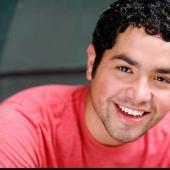Best of 2010-2011: Tracey Maloney
Editorial

One year ago I knew absolutely nothing about the sport of football. A year later, I found myself sitting in a bar having a heated argument with a close friend before the big draft in our Fantasy Football league. I had devoted the past year to reading Sports Illustrated and following online football blogs, so I could learn to draft the best team for a season of Fantasy Football with my friends. This year, our conversation quickly ignited over debates about last season’s performance, explanations of player's final stats, rumors of player development in preseason training, and strategies for team building for the new season.
After a few hours and too many beers, I could feel my sports-loving friend dreading the moment that was coming—it was, after all, unavoidable. When you are having drinks with a person who works in the Arts, you will eventually have to ask about what is currently happening in their artistic life. If your sports-loving friends are like mine, and the last time they were passionate about theater they were five and scared of the Wicked Witch running down the aisle at them, the arts can seem as foreign as Oz.
But the childlike passion my friends feel when they scream over the Vikings or Twins is the same passion I feel when I am arguing with a friend who also works in the Arts over two theater companies take on the same show. I can go out with a performing artist friend and have long, exhausting arguments over countless aspects of a show: who may be pushing, who was phoning it in, where a lack of direction creeps in, when scripts are overwritten, and, overall, the difference between good and bad storytelling. My sports-infused friends feel left out of the conversation and completely lost. They are unfamiliar with the terms we are using to critique the performance and admit that they watch theater—if they watch theater—ignorant of the craft needed to create it.
Imagine a world where fans of football watched the game without understanding how the players earned a touchdown. How could plays be differentiated from one another or even understood without a sense of how they work toward a goal? How could fans choose skilled players from flukes? It would be impossible to build a fan base around any one team without understanding the specific skills different players bring to the team to help win. Eventually, football would lose fans because wins would seem like a random happenstance depending on the night. Passionate fans aren't general appreciators of something they do not understand; they dig deeply into the game and root for specific teams. In other words, football fans need to be able to understand the skills of football players to truly appreciate the whole NFL experience.
theater, be like sports
Actors are also athletes. Directors are like head coaches, and the script can be considered the playbook for the evening. The success or failure of a show is less important than the means of presentation; the way a play is performed should become the backbone for the critic to analyze. If reviewers wrote reviews in the spirit that sportswriters write about athletes than the audience would become knowledgeable about different teams (theater companies) and players (actors/directors/designers) in the same way sports fans follow teams and players during the season. The specific games (performances) become as important as the teams playing them during the season. And the shows themselves become a collection of live moments where performers transform space, trade breath, hit emotions effortlessly, and keep auditoriums held in the same silent anticipation as Wimbledon:Around forty minutes into God of Carnage at the Guthrie Theater, actress Tracey Maloney, who had crafted a character that appears to be the quiet, beautiful, sophisticated wife of a loud, obnoxious fast-talking husband, was about to unleash her inner beast. Suddenly, she grabs the flowers she brought as a gift at the top of the evening, breaks her husband’s phone, and climbs on top of a couch in infantile, school-girl triumph. How did Maloney make such a huge character shift believable? In Yasmina Reza’s play, wild emotional swings can seem empty and untruthful when not fully disciplined. Like her costars, Tracy meticulously mapped her character’s shifts from the moment she entered the stage. In an apartment space designed for status battles, Tracey’s Annette at first avoided most eye contact and darted to the couch in search of comfort. There, she added sweetness to disagreements and desperately tried to diffuse arguments with grace, never allowing her true discomfort to show. Tracy’s specific choice to only let Annette’s inner life boil through in quick glances at her husband, or well-placed sighs of passive-aggressive disagreement, guided the audience to an easy understanding of their relationship. These initial character choices provided plenty of room for growth over the course of the 90 minute play and allowed for huge comic surprises. After the first few fights, the audience is dying for Annette to give up the nice girl image and join the rest of the bullies on the playground. Tracey manipulates this anticipation with a slow build, then delivers full throttle when the time finally arrives to bully. Her eye to detail allowed for the big payoff without an audience suddenly questioning whether such extreme behavior is motivated or judging her too harshly for her violence. Well-played, Tracey Maloney.I wish more theaters were able to grab the same kind of wildly obsessive fans that fill the seats of stadiums and arenas every year. Too often my friends claim a general appreciation for the arts but cheer for no specific theaters during the season. They may enjoy going to theater but do not know the difference between Ten Thousand Things or In Heart of the Beast. They may see an out-of-town tour of Avenue Q at the Orpheum and love it but think that is the only way to play it, so they miss Mixed Blood’s take it on with all new players and a different head coach. They see Shakespeare as impossible to understand, so they never witness a team like The Strange Capers "defeat" the master and make him feel as familiar as a Judd Apatow film. I long for the day one of my friends get the itch to learn about the arts in the same way I suddenly wanted to understand football. Unfortunately, I think they would have to study for a long time before playing Fantasy Performance because technique is kept out of reviews. There is nowhere for them to learn the terms needed to articulate their passionate feelings. Wouldn't it be great to have more bar fights with all your friends over who played the game of Hamlet better: Team Guthrie or Team Jungle or Team Theater in the Round Players? For now, we will just have to settle for the same old arguments over Gardenhire’s lineup and whether or not Frazier can coach a magical performance out of McNabb.




